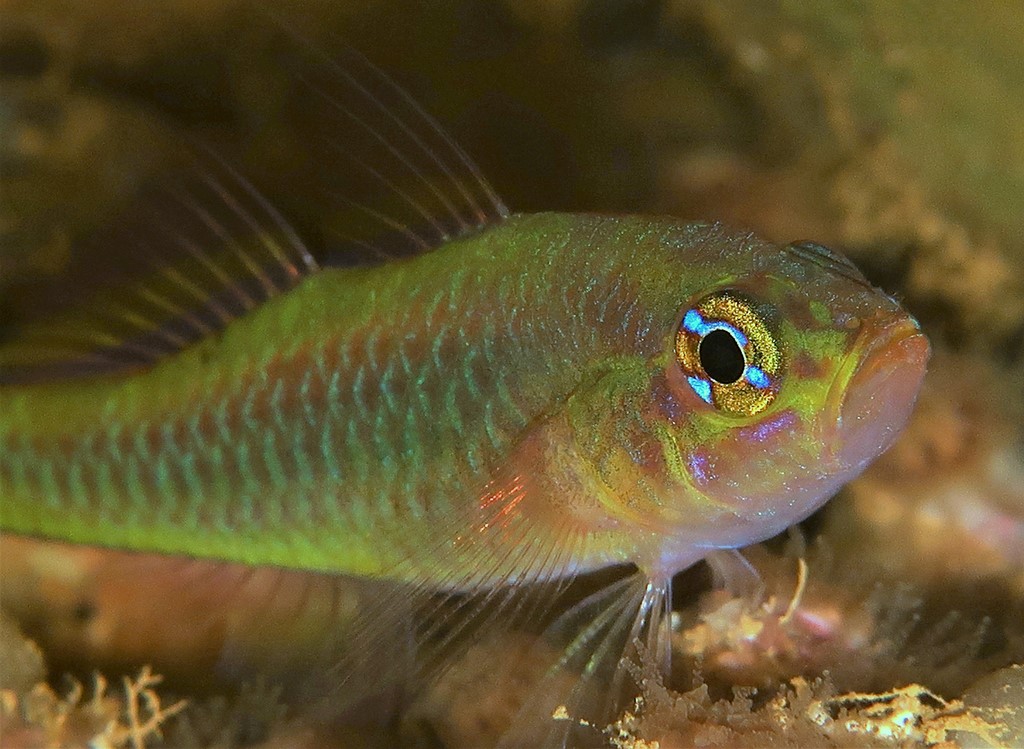TRIMMA GIGANTUM - (WINTERBOTTOM & ZUR, 2007)
Picture courtesy of: Alain Daoulas
Actinopterygii (Gigaclass) > Actinopteri (Class) > Teleostei (Subclass) > Gobiiformes (Order) > Gobioidei (Suborder) > Gobiidae (Family) > Gobiinae (Subfamily) > Trimma (Genus)
Gobie pygmée géant, Giant pygmygoby,
Description
Dorsal spines (total): 7; Dorsal soft rays (total): 8-9; Anal spine: 1; Anal soft rays: 7-9; Predorsal scales: 15-18; The second and third dorsal spines elongate; A fleshy, longitudinal ridge in the interorbital midline; Absence of postorbital trenches; Scales covering the cheek and opercle; The fifth pelvic fin ray usually branched dichotomously once. Max. length: 3.0 cm SL. Depth range: 20 - 73 m.
Color
A pattern of six dark saddles across the dorsum on a pale yellow background.
Etymology
Trimma: from Greek, trimma, -atos = something crushed.
gigantum: from Latin, gigāns = giant. Referring to its extremely large size (for a pygmy goby), up to 29.9 mm SL.
Original description: Trimma gigantum Winterbottom & Zur, 2007 - Type locality: Augulpelu reef, cave in steep reef slope, 7°16'24.8'N, 134°01'26.6"E, Palau, depth: 73 meters.
Distribution
Western Pacific: Philippines, east to Palau; Raja Ampat Islands (West Papua, Indonesia), New Caledonia (Prony, Bourail).
Biology
Inhabits outer reef slopes in caves and crevices.
Actinopterygii (Gigaclass) > Actinopteri (Class) > Teleostei (Subclass) > Gobiiformes (Order) > Gobioidei (Suborder) > Gobiidae (Family) > Gobiinae (Subfamily) > Trimma (Genus)
Gobie pygmée géant, Giant pygmygoby,
Description
Dorsal spines (total): 7; Dorsal soft rays (total): 8-9; Anal spine: 1; Anal soft rays: 7-9; Predorsal scales: 15-18; The second and third dorsal spines elongate; A fleshy, longitudinal ridge in the interorbital midline; Absence of postorbital trenches; Scales covering the cheek and opercle; The fifth pelvic fin ray usually branched dichotomously once. Max. length: 3.0 cm SL. Depth range: 20 - 73 m.
Color
A pattern of six dark saddles across the dorsum on a pale yellow background.
Etymology
Trimma: from Greek, trimma, -atos = something crushed.
gigantum: from Latin, gigāns = giant. Referring to its extremely large size (for a pygmy goby), up to 29.9 mm SL.
Original description: Trimma gigantum Winterbottom & Zur, 2007 - Type locality: Augulpelu reef, cave in steep reef slope, 7°16'24.8'N, 134°01'26.6"E, Palau, depth: 73 meters.
Distribution
Western Pacific: Philippines, east to Palau; Raja Ampat Islands (West Papua, Indonesia), New Caledonia (Prony, Bourail).
Biology
Inhabits outer reef slopes in caves and crevices.
